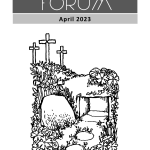Featured News
Featured News
Thought for the Week – 23rd April 2023
What are is Faith?
This musing is based by an article in the Church Times by Andrew Brown. He begins by quoting the journalist Camilla Cavendish on her planned attendance at an Easter service.
“I will be going to church this Sunday, despite not believing in the resurrection. I’ll be there to accompany an elderly relative, but also for a dose of ritual and rhythm, to sing with strangers and to be able to quietly reflect on things outside myself. It occurs to me that I seek similar benefits from yoga and mindfulness, both of which have their roots in eastern faiths. The much-vaunted decline of religion is perhaps not quite what it seems. We avidly read self-help books telling us we will be happier if we express gratitude but have lost the rituals which enabled us to do that. We mourn the loss of community but are unsure how to reconstruct it. I envy my Jewish and Muslim friends… That doesn’t mean I want to spend hours being preached at… But it does seem unfortunate to have reached a position of either having to embrace every aspect of a faith or else denigrate it”
I’m not sure I understand what it means to embrace “every aspect” of Christianity; my own faith comes from questioning it and accepting that often there are no simple answers. But, like Camilla, in the ritual and rhythm, I find something that speaks to me; as Andrew Brown comments, something that enters into me and resonates with me. As he puts it, the more it enters into me, the harder it can be to explain it, although I am driven to do that. But in that process, I encounter mystery; I do not embrace it, somehow, it embraces me.
Thought for the week, 29th April; Love bade me welcome
This poem, technically known as Love (III) is by George Herbert, a 17th century priest. I first met it as an undergraduate and 40 years later it still speaks to me.
LOVE bade me welcome; yet my soul drew back,
Guilty of dust and sin.
But quick-eyed Love, observing me grow slack
From my first entrance in,
Drew nearer to me, sweetly questioning
If I lack’d anything.
‘A guest,’ I answer’d, ‘worthy to be here:’
Love said, ‘You shall be he.’
‘I, the unkind, ungrateful? Ah, my dear,
I cannot look on Thee.’
Love took my hand and smiling did reply,
‘Who made the eyes but I?’
‘Truth, Lord; but I have marr’d them: let my shame
Go where it doth deserve.’
‘And know you not,’ says Love, ‘Who bore the blame?’
‘My dear, then I will serve.’
‘You must sit down,’ says Love, ‘and taste my meat.’
So I did sit and eat.
Rev David Poyner
Thought for the Week – 16th April 2023
The Real House of God
Over 60 years ago, the late Bishop John Robinson published a book, “The New Reformation”, in which he accurately foresaw how the church of his day was facing a crisis as it appeared increasingly irrelevant to the world. How much more so in our own times… I was recently reminded of a quotation from the book; “The house of God is not the Church but the world. The Church is the servant. and the first characteristic of a servant is that he lives in someone else’s house, not his own.”
John Robinson died long before our current awareness of climate change and the threat that it poses to the planet. But, as this coming Saturday, 22nd, marks International Earth Day, it is worth pondering on the full implication of his words. We often talk about a church building as “the house of God” and I appreciate the importance of a place made holy by prayer and worship. But the real house of God is the world we encounter when we step outside of the church door and that is what Christians, indeed all people, are called to serve. That world, that house where God dwells is also the home of the natural world; all living creatures. John’s words are a reminder that caring for God’s house means we must care for our planet and its many environments.
Rev David Poyner
Thought for the Week – 9th April 2023
Joy
For many reasons, Easter is often a time of year when we might be expected to be joyful, whether this is based on Christian conviction or the coming of Spring. It is not always easy to be joyful. This passage is taken from a recent article in the Church Times by Ayla Lepine, associate rector of St James, Piccadilly; I found it helpful.
Joy is very different from happiness. Tiffany Watt Smith describes joy as a “refusal to sit quietly within the bounds of the ordinary and understood”. Joy can be a form of resistance, too, defiance in the face of suffering. A young poet recently described joy in an exhibition at the Wellcome Collection in London, which was part of her project “Joy is a Protest”. These are her words:
It slips into the places we least expect it
It squeezes itself into cracks and small places
The sound of joy beats to the rhythm of your pulse
It is in your blood
It has written its name on your DNA
Joy is your birth right.
May we all experience joy, our birth right, this Easter.
Rev David Poyner
Thought for the Week – 2nd April 2023
The Scandal of the cross
And so, after the 40 days of Lent, we enter Holy Week. Depending on your spirituality, a week of deep devotion culminating in the joy of the Resurrection, or a celebration of Hot Cross Buns and chocolate Easter Eggs. Some of us manage to hold both aspects together. Perhaps it is significant that it has been easier to secularise Easter Sunday, with a popular symbol that has only a tenuous connection with the Christian story of resurrection compared to Good Friday; Hot X Buns anyone? The cross remains in popular culture a symbol of Christianity. Not all are comfortable with this. The journalist and a vice-president of Humanists UK, Polly Toynbee questions “Why wear the symbol of a barbaric torture?” But the cross persists, as a symbol of hope and kindness.
Polly Toynbee’s bafflement at the cross is as old as Christianity. St Paul, probably writing just over 30 years after the crucifixion spoke of how the cross was foolishness to the opponents of Christianity; Christ crucified was a stumbling block to Jews and folly to the non-Jews. The Greek word that is often translated as “stumbling block” is “skandalon”, from which we get “scandal”. It is actually derived from the word for a trigger of a trap, that would catch its victim by the leg. However you look at it, it seemed at best bizarre to Paul’s contemporaries that an instrument of execution could become the tool of a God who works and wins by love. But Paul understood; the foolishness of God destroys the wisdom of humankind, the weakness of a God who rules from a cross is stronger than all the powers of humanity and darkness. That is why I wear the symbol of a barbaric torture.
Rev David Poyner

